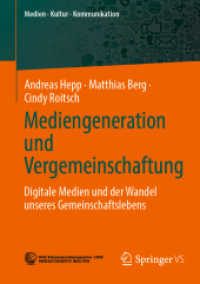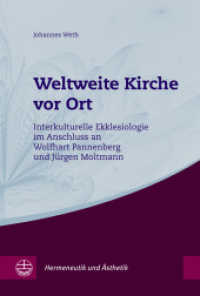Full Description
The book presents observations concerning automated decision-making from a general point of view at the same time as it analyses the manner in which praxis in some jurisdictions has evolved as concerns automated decision-making and how the requirements that are placed by the legal orders on it are formulated.
The principle of the rule of law should apply in the context of automated decision-making of public authorities just as much as when the decision-makers are physical persons. In sync with increasing automatization of decision-making in public authorities, problematizing questions about the appropriate legal basis for algorithmic decision-making have started emerge. How should the principle of the rule of law apply within the area of automated decision-making, how should automated decision-making be regulated so that it satisfies the requirements created by the principle of the rule of law, and how should the principle of the rule of law be made concrete in decision-makingthat is based on algorithms? The proposal for an AI Act launched by the European Commission in April 2021, including an identification of high-risk uses of algorithmic techniques, raises further questions concerning practices and interpretations related to automated decision-making.
The state based on the rule of law proceeds from the maxim that public powers are exercised within a legal frame that makes the exercise of public powers foreseeable in light of legal norms. Also, a state based on the rule of law requires that the contents of the exercise of public powers is regulated by legal norms, which means that the citizens must be able to know everything that is relevant about how the powers will be exercised, not only who it is that will exercise the powers. Because of rules and principles of this kind, including non-discrimination and proportionality, the exercise of powers will not become arbitrary.
Contents
Introduction.- 2. Situating the Rule of Law in a Context of Automated Decision-Making.- 3. Legislating for Legal Certainty, with a Right to a Human Face, in an Automated Public Administration.- 4. Formal, Procedural, and Material Requirements of the Rule of Law in the Context of Automated Decision-Making.- 5. Automation in Administrative Decision-Making Concerning Social Benefits: A Government Agency Perspective.- 6. Artificial Intelligence, Public Administration, and the Rule of Law: Towards the Uncertainties of a New "Rule of Algorithms".- 7. Discretion, Automation, and Proportionality.- 8. Legislating AI: A Matter of High-Risk Administration?.- 9. Algorithms in Public Administration: Legal Implications.- 10. Concluding Reflections on the Digitalization of Government Functions through Automated Decision-Making, with Some Wider AI Issues.








